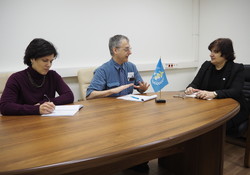Palliative care workers from across the Russian Federation confirm commitment to improving care

WHO
On 29–30 November 2017, Moscow hosted the largest annual scientific and educational conference on palliative care in the Russian Federation. Medical doctors from all regions of the country and international experts took part in the event, organized by the Russian Association of Hospice Care Professionals. They learned international and national best practices, and reviewed ways to improve palliative care for adults and children in the country.
The palliative care professionals engaged in comprehensive and topical discussions in lectures, master classes, clinical case studies and roundtables. Among the most-discussed issues were:
- palliative care management and integration with other health-care services;
- the legal framework for palliative care;
- pain relief and clinical management of other severe symptoms;
- the quality of life of patients and their families;
- the development of training activities and materials; and
- the ethical, psychological and spiritual aspects of palliative care.
WHO’s palliative care expert Dr Eric Krakauer offered 2 master classes for medical doctors, the first on palliative care for patients with dyspnoea and the second on optimum use of life-sustaining treatment. He also presented a lecture on the neurobiology of pain.
Dr Elena Yurasova, Coordinator of Noncommunicable Diseases at the WHO Country Office in the Russian Federation, spoke at the opening of the conference. She noted that serious work has been done to promote the principles of palliative care in Russian society, but that much work remains.
Palliative care improves the quality of life of patients and their families who are facing problems associated with life-threatening illness, whether physical, psychosocial or spiritual. It is explicitly recognized under the human right to health, and in key global mandates and strategies on universal health coverage, noncommunicable diseases, and people-centred and integrated health services.
The majority of adults in need of palliative care have chronic diseases such as cardiovascular diseases, cancer, respiratory diseases, tuberculosis, AIDS or diabetes. The gap between access to and need for palliative care is enormous; currently, an estimated 40 million people worldwide need palliative care every year, but only about 14% of them receive it.
In 2014, recognizing the severity of the problem, the World Health Assembly adopted resolution WHA67.19 on strengthening palliative care as a component of comprehensive care throughout the life course. This first-ever global resolution on palliative care calls for improved access with an emphasis on primary health care and community/home-based care. It asserts the ethical duty of health-care professionals to relieve suffering and to respect the dignity of people.
WHO support in the Russian Federation
Through its Country Office, WHO provides support to the Ministry of Health in the area of palliative care by assessing the situation and providing technical advice.
On 1 November 2017, Dr Krakauer met with WHO Representative to the Russian Federation Dr Melita Vujnovic. They discussed additional WHO support for the integration of palliative care at all levels of the health-care system and in medical education at under- and postgraduate levels.
This followed an assessment conducted by WHO in March 2017 that recognized the Russian Federation’s enormous progress on policies relevant to palliative care since 2011. A series of policies and initiatives in the past 6 years led to the endorsement of the Roadmap to improve access to opioids for medical purposes in 2016.
Key milestones included:
- the affirmed right to pain relief;
- the establishment of palliative care as one of the 4 basic types of medical care;
- targets for the number of palliative care beds per population; and
- the inclusion of basic inpatient and outpatient palliative care on the list of care provided free of charge.
Additional plans will ensure human resources development and the integration of palliative care at all levels of health care and by all medical care providers.
WHO will continue to support improved quality of and access to palliative care in the Russian Federation by developing relevant policies, by studying the economic effects of effective types of palliative care, and by establishing education programmes for health professionals. WHO is also exploring the potential for developing a WHO collaborating centre for palliative care training in the country.



